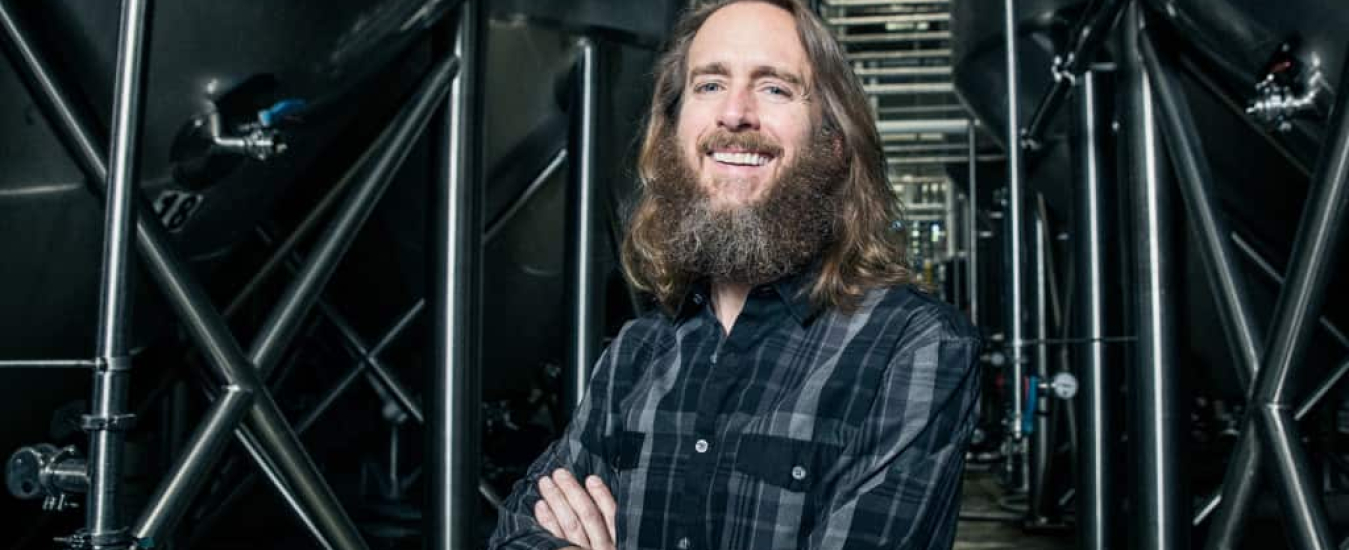

God is Good: Stone Brewing Co.’s plan of not having a plan
By Philip Eggersgluess . October 15, 2014
In the old days, Stone Brewing Co.’s Greg Koch tells us, before people understood such things as yeast and fermentation, brewers would explain each successful batch of beer by exclaiming that God is good. This approach of running on faith and entrusting the success of a product to a higher power is reminiscent of how Greg hopes his craft beers will conquer Berlin.
We met up with Greg Koch, founder of the Stone Brewing Co., for a crash-course in craft beer at Herman’s Belgian beer bar. We started by trying to pin down exactly what makes a beer a craft beer. Is it about being small-time? Is it about being handcrafted? We came to the conclusion however that, just like the words “hipster” and “Kreuzkölln”, an exact definition for “craft beer” can be elusive.
Some core pillars of craft beer, and ones especially important to Greg, are that the beers are made with love, using local and top quality produce, are sustainable, and care about the environment. They are also experimental, taking inspiration from beers and ales from all over the world, and have a freedom with flavours, ingredients and processes unconstrained by rules such as Germany’s hallowed Reinheitsgebot. This variety means there will be some you’ll love and some you’ll hate, but the ones you love you’ll really love. This runs contrary to the countless industrial beer brands which aim to taste inoffensive and unexceptional.
These big, industrial breweries are firmly in Greg’s sights. Their beer leaves a bad taste in his mouth for many different reasons and he’s on a mission to shake up the brewing establishment and bring some actual choice to the Berlin beer market. How’s he going to do that? He’s not precisely sure. Instead of working off a plan, he’s steaming ahead on pure passion, faith in his beers, and a belief that people will recognise quality when they taste it. He’s winging it with swagger and determination that means, to the status quo, he could be very dangerous.
Stone Brewing Co. began as a small venture in southern California in the mid ‘90s. It has since grown – despite many challenges and setbacks – to become one of the US’s top craft beer breweries. They have just sunk $25 million into constructing a huge brewery/restaurant complex near Berlin’s Alt-Mariendorf, from where they aim to make an impact in Berlin, Germany and the rest of Europe.
Now, $25 million is a lot of anyone’s money to invest, and seeing as Stone has almost 1,000 employees to consider, shouldn’t the company have a cast-iron plan for their European venture? It seems they have very little in terms of numbers, sales strategies, evangelists, deals with bars, supermarkets, clubs and restaurants, and Greg certainly isn’t worried by this.
Greg Koch is not someone who seems unsure of himself. And one thing he’s unfaltering about is his faith in his beer. There’s something of a Field of Dreams ‘build it and they will come’ philosophy to Stone’s plan. But, considering their success in the US, why not?
If this century has taught us anything, it’s that toppling the Old Guard isn’t just possible – it’s inevitable. Just like what happened to the music, film and publishing industries, and will now happen to the international banking system and even how we book taxis (think of the storm Uber has created), new, fast-moving companies with a different approach and grass-roots support can challenge and break the biggest institutions. And the craft beer ‘revolution’ certainly represents a social movement away from cold mass-production. If Greg’s vision were to come true, in a few years from now we’d be looking at the Radebergers and Beck’s of the world in the same way we currently see McDonalds and KFC.
If the big brewers should be worried, what about Berlin’s own fledgling craft brewers? Maybe it’s naive to think that the world craft beer brewing isn’t as dog-eat-dog as Big Business, but Greg certainly has a great deal of respect for those who share his passion for great beer. With a track record of producing collaborations with other brewers and breweries, perhaps Stone Brewing Co. could create a few Berlin-inspired craft beers. Also, Stone’s financial clout and reputation might help Berlin’s craft beer scene move from the niche into something more mainstream. This, in turn, would broaden the market for all of Berlin’s craft beer brewers.
We all have to wait a year until Stone’s brewery is completed to see how this story ends. In that time, we know Greg will be busy travelling around Europe, converting people to his cause in his own inimitable way, and we will be watching closely. Will Stone Brewing Co.’s cavalier approach to beer and business succeed in Berlin? Let’s hope God is good.






